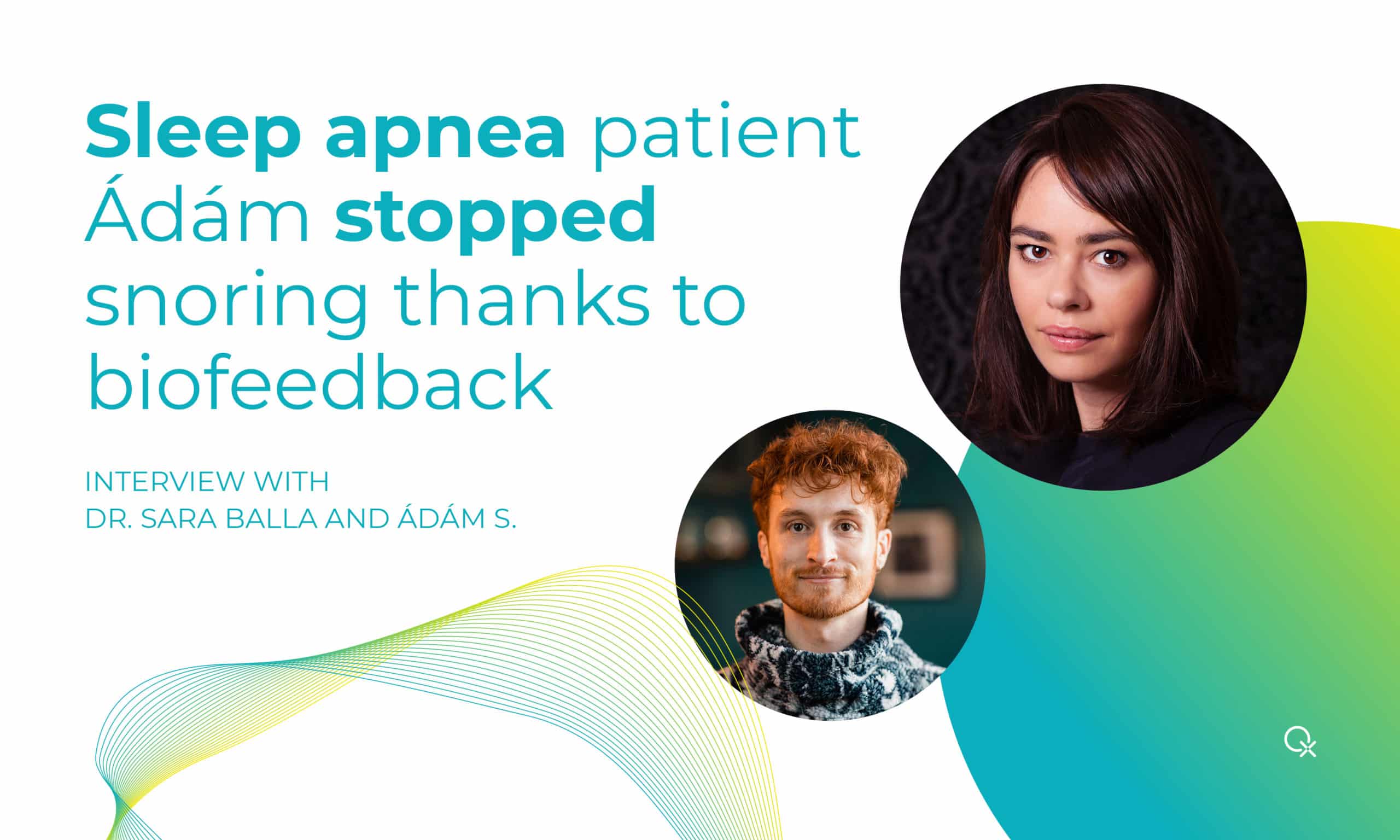
“It’s like my body just didn’t know how to recharge.” When Ádám S. arrived at Dr. Sara Balla’s practice, he – and his wife – had not had a good night’s rest in months due to his sleep apnea. Ádám’s somnologist had recommended wearing a CPAP device at night, but he felt reluctant to do so. Thanks to regular biofeedback sessions with Dr. Balla, Ádám has now stopped snoring and is sleeping much better.
Ádám: In the summer of 2018, I started feeling exhausted and low on energy, even though I spent 8 to 9 hours in bed. I would wake up with a sweaty neck every single day. Because the snoring was so bad, my sleep apnea began to affect my wife’s sleep as well. She also noticed that I would regularly stop breathing in my sleep, followed by even louder snoring and panting, which obviously concerned her very much.
Ádám: I did try wearing it, but it just felt so uncomfortable, as you can imagine. I hated the idea of having to wear that mask and machine for the rest of my life, to avoid further symptoms. It was then that I decided to book a biofeedback session with Dr. Balla.
Dr. Balla: Yes, I do see many people with sleep disorders in my practice. The main reason is, I believe, the fact that biofeedback has no side effects. It can be very effective in dealing with sleeping problems without any drugs being involved. Mind you, I always advise clients to continue taking the drugs and dosages prescribed by their GP. Many of my insomniac clients take anti-anxiety drugs, for instance, and it’s unwise to cut down on those without professional guidance.
Dr. Balla: What exactly causes sleep disorders is hard to say as each case is different. While insomnia is almost always connected with stress and anxiety, it is not entirely clear whether it can cause sleep apnea. Often, anxiety-related insomnia comes down to overthinking due to a fear of losing control. As far as sleep apnea is concerned, being overweight is definitely a risk factor.
Ádám: Indeed, I was also prone tended to worry a lot once I closed my eyes at night, but rather as a consequence of my sleep apnea. I would wake up feeling very tired in the morning and continued feeling sleepy throughout the day. I was having trouble concentrating at work, and my manager warned me that if I continued making mistakes they would have to let me go. I started to think … what if I lose this job? I won’t be able to pay my mortgage without it. That gave me the final push to go and see Dr. Balla for help.
Dr. Balla: First, allow me to clarify what sleep apnea does to the body. The lack of oxygen, which occurs due to shortness of breath, is detected by chemoreceptors that have an awakening effect on the brain. These awakenings, which take a few seconds, are usually easy to pick up on as that is when the loud snoring happens. While the patient is snoring, the blood oxygen levels are being stabilized. In patients with severe sleep apnea, breathing can stop up to 30 times an hour. In the long term, the breathing interruptions raise the risk of developing cardiovascular problems. The awakenings at night also cause fatigue, making patients feel sleepy during the day and have difficulty concentrating.
Combining stress management techniques with a healthy diet and light exercise is proven to be very efficient in helping patients who struggle with sleep apnea. Using a biofeedback device that measures heart rate, breathing patterns, and even brainwave activity, I can show the client exactly how their body operates. It helps them to sense when their body’s stress and anxiety levels are surging, and to act on them. I also teach them various relaxation techniques, to lower their heart and breathing rate, for example. When clients are able to let go of their worries, it naturally makes falling and staying deep asleep much easier for them. As a result, Ádam lost 10 kgs within 3 months and his snoring is much better now.
Dr. Balla: It certainly can, because obesity is often due to food addiction. For these people, food has a relaxing effect not unlike the effect nicotine has on people who smoke. My biofeedback device, which is a quantum biofeedback device, attempts to create new pathways in the brain. It uses frequency-specific microcurrent, which is of course totally safe, to re-educate the cells that make up the emotional processing system. In Ádám’s case, the biofeedback device also hinted that his body could benefit from a diet free of gluten, sugar and lactose.
Ádám: I’ve stopped snoring, right after the first appointment already, and my breathing became normal while asleep. Once I finished all the sessions, I was getting up feeling fresh and full of energy, too. I’m sleeping so much deeper now. Another thing is that I cope much better with stress; I do not see problems unsolvable anymore. It is as if my brain has been re-wired completely. I can only recommend. Still working on the last few pounds, though <laughs>.
Dr. Sára Balla, MD, is a general practitioner and biofeedback specialist. She runs a successful practice in Budapest, where she combines her medical training with biofeedback technology and complementary healthcare. Dr. Balla’s practice focuses on both health and beauty, providing her clients with all the benefits biofeedback can offer.
Ádám S. (27) is a customer relations advisor living in Esztergom, Hungary. He loves yoga, running together with his wife, and taking long walks with their dog.
+1 (989) 681-1063
+1 (856) 322-8589